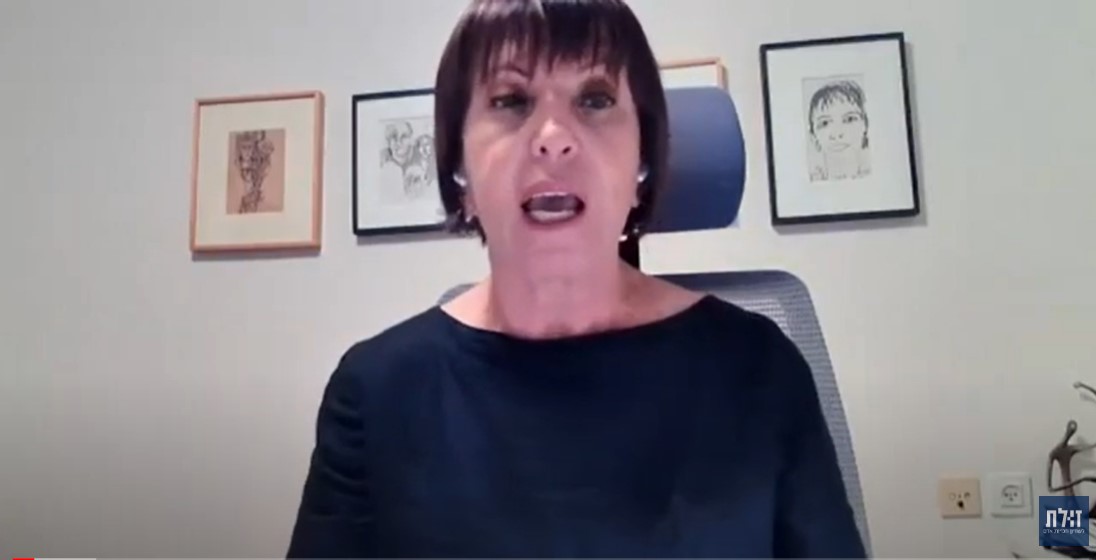On Tuesday, 23 May 2023 Zulat held a Webiner entitled “Regime Revolution is Bad for Your Health” , dealing with aspects of health in the regime revolution.
Zulat’s President, Zehava Galon made the opening speech:
“We are gathered here, when at this moment the Knesset is voting on the State Budget, a great disgrace. The budget has become hostage to the revolution that the Prime Minister Netanyahu is promoting to enforce his ruling. Thousands are demonstrating now in Jerusaelm, against this disgaceful approach where we saw a Turkish Bazaar where every participant took whatever possible, 14 billion Shekels of the coalition budget with the majority of this going to sectorial needs of the ultra-orthodox and the national settlers. None of the budget will go to health or welfare, old age pension, nor to public housing, victims of sexual abuse, battered women or holocaust survivors. Where is the promised addition of 5.8 billion shekel for the board of health? It’s a mockery what was confirmed”

Prof. Martin Mackie, President of the British Medical Association and past President of the European Public Medical Association:
“Common to both Israel and Britain, is that neither have a Constitution. In regulation like this, the Supreme Court has an important role in creating an atmosphere where Health issues are of the highest priority of the government creating trust between the government and its citizens. During the Covid outbreak in Britain the virus was not successfully eliminated in areas of ethnic minorities. There was a problem with the people who could not work from home which created a virus incubator.
If there is a problem in Israel of inequality regarding Arab citizens, it affects coping with diseases and public health. Another lesson can be taken from the British Brexit. Consequences of the Brexit are catastrophic to public health, and sadly many physicians avoided political expression of this. The true dangers must be voiced, precisely and if correctly stated your words will be heeded. If you wait it will be too late and you will regret this, as many in England regret not voicing themselves in the Brexit. There are people in the Ministry of Health and the Academic field who restrain from expressing political views, but many can voice themselves and I urge them to do so”.

Prof. Hagai Levine, Public Health Specialist:
“The research literature on the subject is clear. When democracy is weakened we cause severe damage to health issues in various ways. Not only by the laws concerning changes in the system of the regime, but also a series of rules pertaining to what we, as health promoters, conceive to encourage discrimination and harm health in other ways.
Without investing in public health gaps in society are widened. This is what the budget will cause. The Chairman of the Health Committee allowed the tobacco companies to participate. This is part ot the attack on the truth, the “gaslighting” we are experiencing here”.
Prof. Bishara Bisharat, Family Health Specialist, elected Chairman of the Society for Promotion of the Arab Community in the Galilee, Israel:
“Without the law court, nobody will defend the weaker society. Then, possibly, the law of state health insurance, of which we are proud even with its disadvantages, will not provide equal service to all citizens. Today, even though there are 5,000 unemployed doctors, there is a lack of doctors – mostly in the Arab society. Inequality already exist in the medical system and it will only be widened with the regime revolution. Already, a Minister has asked for separation of Arab and Jewish women in the Delivery Rooms and in practice this is instigated in a small number of hospitals today”.
Dr. Adv. Shelly Kamin-Friedman, Public Health and Human Rights Specialist and Peer Research Member of Zulat:
“The High Court ruled to prevent exposure of children in the Sha’afat area to hazardous materials, stating that schools should not be opened next factories. Let me remind you of the High Court intervention of the decision of ex-Finance Minister, Moshe Kahlon to reduce taxes on tobacco. These are cases where the use of the “reasonability” clause by the High Court protected health issues”.
Dr. Ido Lurie, Psyciatrist:
“There is an increase in mental distress in the current times in the general public, in all political spectrums. About a quarter of all referrals to “Eran” are connected with the regime revolution. We already know that the health and welfare systems are at a deficit and budget changes will be devastating”.
Prof. Dorit Nitzan, Director or the Emergency and Disaster Management in the School of Public Health and Head of the Initiative for Food Systems, One Health and Resilience, at Ben Gurion University:
“Today, our professionalism is under attack. Being a doctor or specialist has become delete. False information is being spread. When a democratic regime is changed, the life expectancy and the average happiness levels are lowered. In those places healthy nutrition becomes a subject for research and an addiction”.
The webinar was summarized by Prof. Nadav Davidovitch, Committee Member of the European Public Health Association’s Governing Board:
“The struggle for the public health is a struggle for human rights. We must remember it is a marathon (run) and there’s a long road ahead. In this struggle we must join forces with other organizations and know how to work together”.
(Translation from Hebrew: Chops Levy)
Watch:





